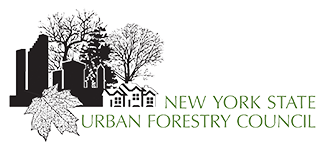
Sophia Rodbell (left) with fellow 2020 MFI grad Jean Zimmerman (center) and MFI Teaching Cadre Member and Council Past President Andy Hillman, enjoying the early spring weather in Gulf Shores, Alabama.
NYSUFC Board Member Sophia Rodbell recently graduated from the 2020 Municipal Forestry Institute (MFI), funded in part by a scholarship from the Council. It was held in Gulf Shores, Alabama.
Can you tell us about your job background and education?
Sophia Rodbell: I started working at Davey Resource Group Inc. (DRG) after graduating from Roanoke College in 2014. I started as an inventory arborist, moved to urban forester, took on more responsibility as a site manager, and then became a project manager when I joined our NYC team to manage the urban forestry component of our office. Prior to moving to NYC I was on the road 365 days a year, working up and down the East Coast, all across the Midwest, as far south as Texas and as far west as California. DRG gave me the chance to see all parts of the United States—as long as they had trees, I was there.
I am currently a DRG Project Manager; I work with a team of five to ten arborists in different places in their careers. This is the same work I previously did, but on a regional scale. We help mid-Atlantic clients—from Northern Virginia to Central New York—with their urban forests. We also have the opportunity to send staff across the country to assist other regional offices; it is awesome seeing them have the same experience I received.
How did you decide to go to MFI?
SR: The first I heard of MFI was a couple summers ago at the New York ReLeaf summer conference at Rochester Institute of Technology. At the industry-famous ReLeaf after-hours hangout, Council President Karen Emmerich, DRG’s Lori Brockelbank, and Plan-It Geo’s Chris Pfeiffer all talked fondly of their time at MFI. I learned that MFI was leadership training specifically tailored to urban foresters and allied professions.
What was the most surprising thing to you about MFI?
SR: The most surprising thing to me about MFI was how intense it was. You are with the same people—in our case 65 participants—from sunup to sundown. By the end of the week you are really sad to leave; everyone goes to the airport together like one big family, and you can just tell that these people will be a part of your life for a long time.
What was your biggest a-ha moment?
SR: My biggest a-ha moment at MFI was the concept of AND instead of OR; how we can use AND to fit urban forestry into nearly every aspect of life. For example, if a state’s governor has a tight budget, we don’t have to fight for funding as if its health/wellness OR the urban forest, it can be health/wellness AND urban forestry by showing all of the evidence-based ways the state’s urban forest improves the wellbeing of its residents.
What is one thing you learned that you are going to apply in practice back in your job?
SR: There are many. Something I am proud to say we were doing prior to MFI—and with the backing of MFI hope to continue—is “planning for succession.” This has to do with training and encouraging the new wave of urban foresters to be skilled, qualified, and certified to do anything and go anywhere. The hope is that you have shown folks the kindness that makes them want to stay. I know our team won’t stay the same forever—people move on to bigger and brighter careers—but if they move on, I want them to have had the best training possible in service of our urban forests.
What would you say to people who are thinking about attending MFI?
SR: I’d say if you are thinking about attending MFI, just do it. There wasn’t a single time during the week that I thought “Pfft, I’m never going to use this.” I found it all applicable, and I am so grateful to have had the opportunity to attend.
I would like to thank the NYSUFC for scholarship funding and to specifically thank Karen Emmerich, Lori Brockelbank, and Chris Pfeiffer for introducing me to MFI as well as MFI Teaching Cadre member and NYSUFC Past President Andy Hillman. I am thrilled to bring back my leadership training to better assist on the Council Board and to help continue to improve the relationship between the citizens of New York and their urban forests.


